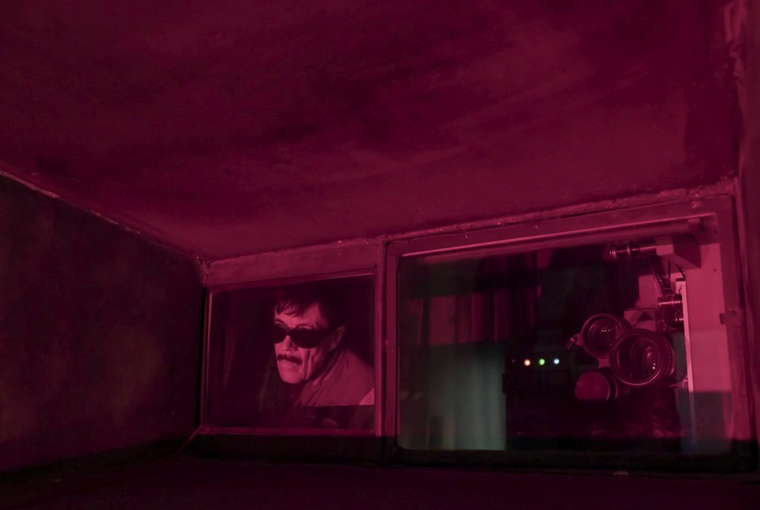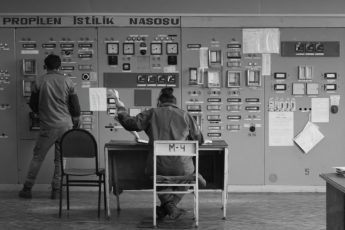The End of the Reel
Yuriy Shylov’s Projectionist (Panorama, 2019)
Vol. 96 (Summer 2019) by Zoe Aiano
Valentin, the protagonist of Yuriy Shylov’s feature documentary, has worked as a projectionist in the Panorama cinema in Kyiv for his whole adult life, which is to say some 44 years. The small back rooms in the crumbling old building serve as his kingdom where he can hang out with his endearingly mustachioed friend Volodymyr, cutting his hair between reels, or get drunk with the girls from the casting agency that shares the space. Chaos reigns in the actual screening hall, with fights and fires breaking out from time to time, raising questions of whether they are attributable to underlying political tumult or simply dysfunction.
Meanwhile, in his life outside of the cinema, Valentin’s time is largely dominated by the need to care for his elderly mother, whose own existence is confined to the one bed in their small apartment. When her son isn’t around to attend to her needs, she blows a whistle attached to the wall and whiles away the time watching TV. Both these worlds soon crumble, however, as the cinema sends Valentin into retirement shortly before it closes altogether, and his mother passes away. As if that weren’t enough, Valentin’s own health begins to decline, and he ponders on the fact that he has already outlived the average life expectancy for a Ukrainian man, i.e. 64, and whether that means he is essentially living on borrowed time.
Given the set-up and the title, it would be reasonable to anticipate one of either two possible intentions motivating the creation of the film, namely either some sort of cinephilic ode to a dying era of film history, or a political commentary on the significance of cultural consumption. While the struggle for the production, distribution and contextualization of media is one of the biggest global issues of the present day, Ukraine has to rank as one of the most poignant cases in point. It can be seen in the artistic output itself, most notably in Donbass, Sergei Loznitsa’s damningly grotesque portrait of fake news and media manipulation during the conflict in Eastern Ukraine. In real life, its implications can be felt in the election of a sitcom actor as president, and in the Occupy Kyiv Cinemas movement that is fighting against privatization in an attempt to preserve not only the cultural legacy of the cinemas themselves, but also the variety of the cinematic programming they have hosted in the past. In this sense, Valentin, and by implication the film made about him, inadvertently find themselves at the center of socio-historical events.
The film chooses neither of these paths, however, instead staying true to the initial intention of a straightforward character portrait. This is of course a completely valid decision, but nevertheless a perplexing one – why make a film in a cinema in an era of heated debate yet refuse to engage with the significance of either the cinema or the debate? Moreover, it causes a certain degree of confusion in reading the film. The film opens classically with archival footage of the Panorama in its heyday, as if setting up a nostalgic elegy, and indeed it takes some time before Valentin is established as the actual protagonist (something compounded by the fact that he is first introduced trying out for an acting role in a commercial). Likewise, the downplaying of the political tensions underlying the fires and closure comes off as allusive, although what exactly is being alluded to remains shrouded in mystery. Indeed, if anything, it draws more attention to it by arousing curiosity, then frustrates by not actually providing any answers.
As the sole focus of the documentary, the burden of continuing the momentum of the film falls on the shoulders of Valentin. While he is indeed charismatically playful and entertaining, and, unfortunately for him, undergoes enough hardships to keep the narrative moving forward, the film suffers from a lack of structure at times and over-direction at others. While the scenes of friends and relatives appearing at his kitchen window like school children looking to play are very endearing, the random shots of girls walking through the cinema in lingerie seem to stray too far into quirkiness for its own sake. Likewise, the continuing visual theme of colorful flashing lights is interesting, but ultimately seems more aesthetic than meaningful. Finally, the repetition of the framing between his treatment of his mother and then later his son’s treatment of him comes off as slightly forced.
On the whole, Projectionist strings together enough funny and tender moments to stay watchable, but with a bit more structure and a clearer intention guiding the editing, the film could have been much stronger. As it stands, it simply follows the downfall of a one-time party guy, leaving a melancholy impression of inevitable decline.




Leave a Comment